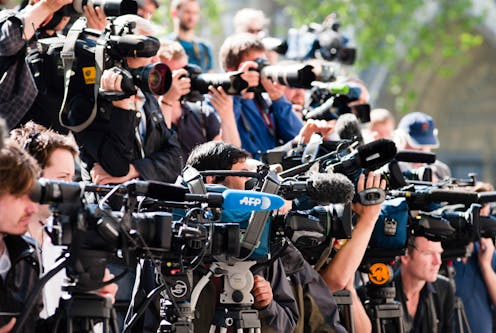
Details of history’s most high profile court cases – from Ted Bundy, to OJ Simpson, to Donald Trump and Dominique Pelicot – were brought into the public domain thanks to the diligent and difficult work of court reporters.
Court reporting is a skilled branch of journalism, taught as a discipline in itself. Ideally, court reporters can write at at least 100 words a minute shorthand (we speak at around 150 words a minute during normal conversation). In the UK, it is against the law to use an audio recorder in court, unless permission is granted by a judge.
Court reporters must have detailed legal knowledge of reporting restrictions (which is often applied on the spot), along with awareness of defamation law, ensuring content is fair and accurate so publications aren’t sued.
But court reporting in the UK is under threat, largely due to the decline of regional press, where the majority of specialist court reporters work.
It is not a job for the fainthearted. Murder, rape, stabbings, child sexual abuse, fraud, drugs, guns, robbery and terrorism are all part of the murky swamp of the court reporter’s daily beat. Court journalists listen to horrific details, and must be able to put aside their own feelings and emotions to report all the evidence – no counselling is offered.
Journalists covering the Lucy Letby case admitted crying during the evidence, or having to run to the toilet to retch. The Daily Mail’s Liz Hull, a seasoned court reporter, attended every day of the trial for her award-winning podcast. She wrote that she cried in court for the first time in her 25 years as a journalist during family statements in the sentencing hearing.
Last year, Le Monde reporters Henri Seckel and Pascale Robert-Diard spent 48 days in a courtroom in Avignon, France, reporting on the trial of Dominique Pelicot and the other men accused of raping his wife Gisèle. They watched videos of the sordid attacks and listened to details of the case day after day, saying: “Every day, we thought we’d seen and heard the worst. But the worst was worse the next day.”
Open justice
The work of court reporters is crucial to maintaining “open justice”. This concept, which dates back to a 1913 divorce hearing, established the principle that justice should be done in public. Journalists are allowed to report from court hearings, and members of the public can observe criminal trials.
The publicity puts pressure on witnesses to tell the truth, helps quell false rumours about cases, and can lead to other victims coming forward or new evidence being uncovered.
As Sian Harrison and Gill Phillips write in McNae’s Essential Law for Journalists: “Reporting of cases helps promote public confidence in the justice system. It deters inappropriate behaviour on the part of the court and full reporting promotes the values of the rule of law.”
It is often a battle for reporters to get details from courts about cases and erroneous reporting restrictions are sometimes made which go against the principle of open justice. Court reporters have to be persistent and more cases are being heard in private.
Court reporting in decline
In 2022, the regional news media sector was about a quarter of the size it was in 2007. This means there are fewer reporters to cover stories. And those who remain are not getting out and about to court as this takes time, so important stories are going untold.
Another issue is the lack of young reporters learning and sticking with shorthand during their training. Industry body the National Council for the Training of Journalists (NCTJ) noted a “lack of staying power” among trainee reporters taking shorthand. It its recent Quality Assurance and Standards Committee Report, Jonathan Baker, chair of the committee, said:
“The lack of journalists with good shorthand is thought to be a contributory factor in the shortage of dedicated court reporters, and indeed of general reporters who are sufficiently competent to be assigned to coverage of the courts.”
The NCTJ has suggested a scheme for court reporting similar to the Local Democracy Reporting Service, a BBC-funded programme that allocates journalists to regional papers to cover local authorities. Young journalists need encouragement and support to stick with shorthand not just from news editors, but from journalism training providers.
In the age of misinformation, the role of court reporters is incredibly important. Starting this month, they will also have more freedom to report from family courts in England and Wales. Traditionally, these cases have been heard behind closed doors, due to the need to protect the anonymity of the parties involved.
This change is thanks to the campaigning of journalists including Louise Tickle, Hannah Summers (TBIJ) and Sanchia Berg (BBC), and follows a successful pilot. It means cases of children being taken into care or placed with abusive parents can be more closely scrutinised.
We need to preserve and protect court reporting. Global news stories start small. And it is coverage of small local news stories gathering momentum that blows them up into high profile cases and forces societal discussion and change.
Polly Rippon does not work for, consult, own shares in or receive funding from any company or organisation that would benefit from this article, and has disclosed no relevant affiliations beyond their academic appointment.
This article was originally published on The Conversation. Read the original article.







